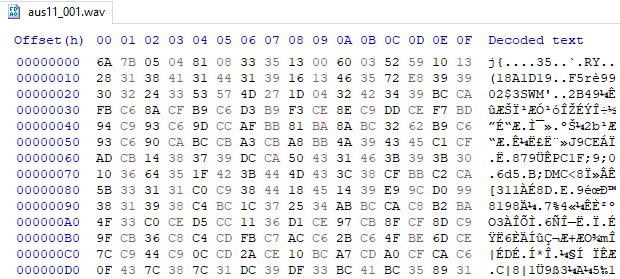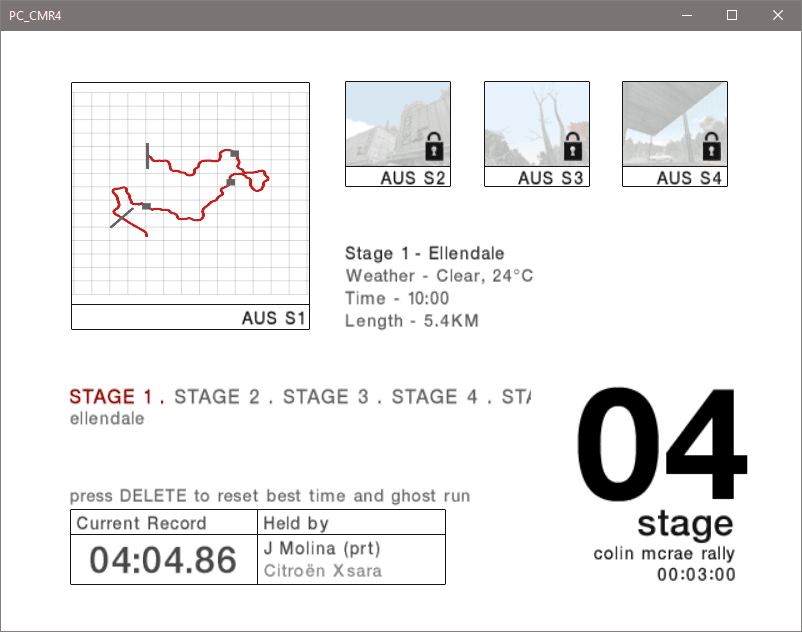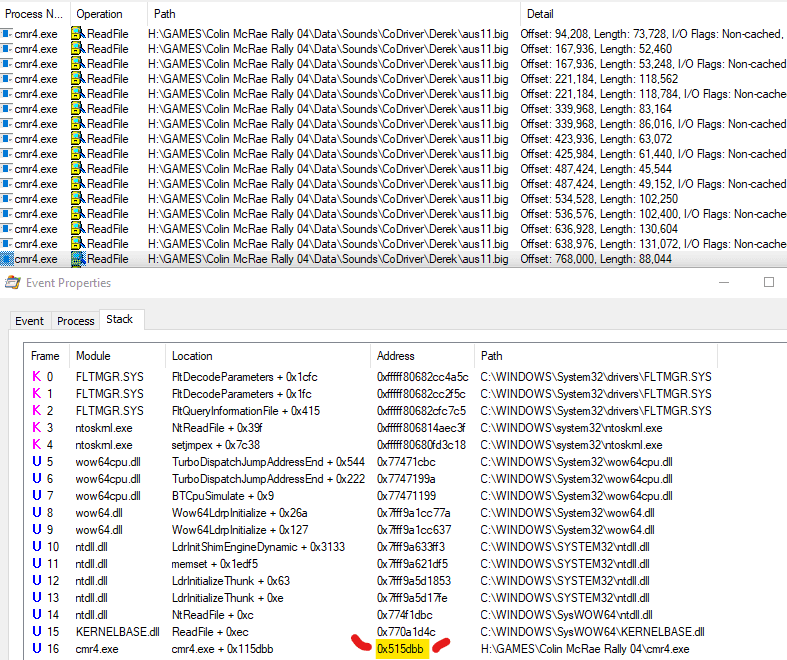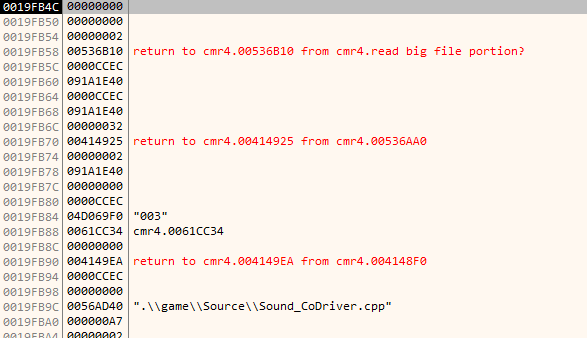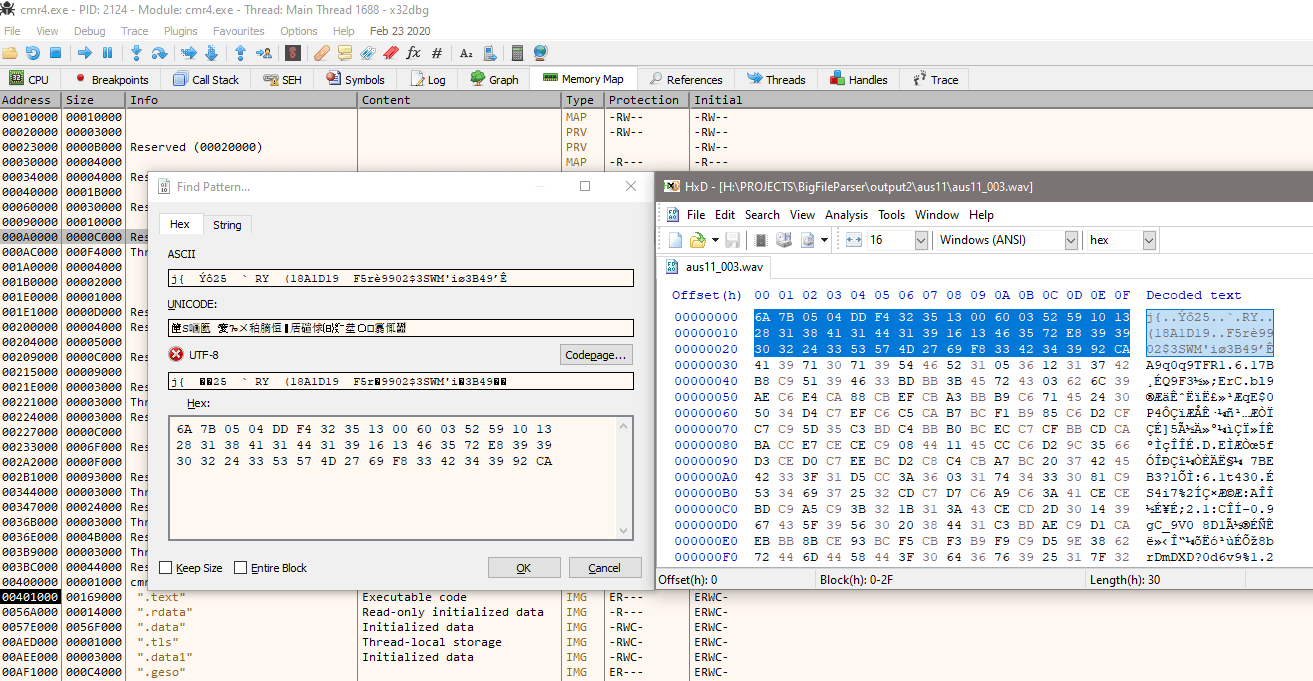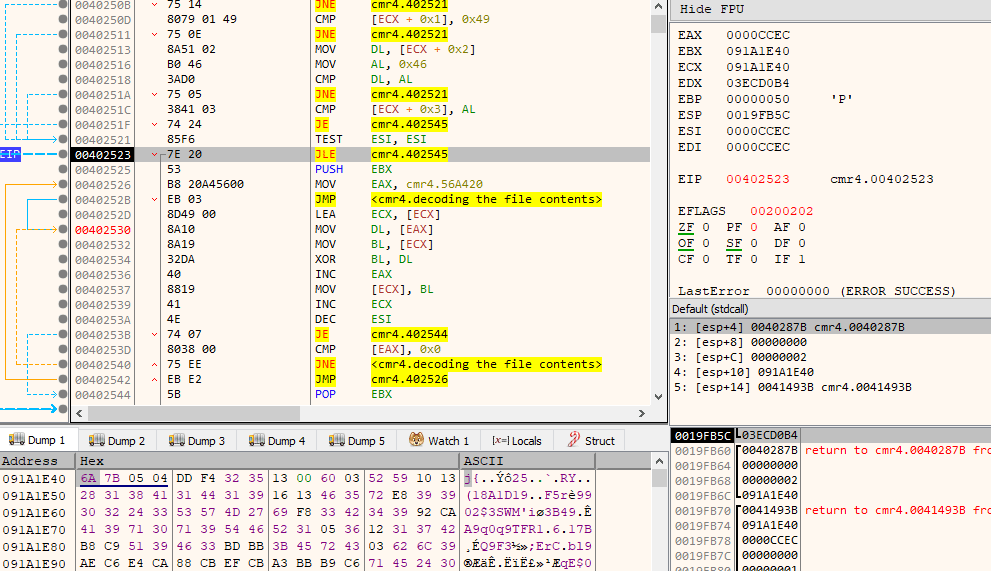Baby's first XOR Cipher in Colin McRae Rally 04
Apr 05 2020
It's expected you understand programming and x86 fundamentals for this reading to be any of your interest.
I was recently contacted and asked if I can open .big files. Whatever they were, one of them was also provided to look at. It turned out to be a resource file that apparently has pacenotes for one of the stages in Colin McRae Rally 04.
Due to previous experience with resource file parsing, this file seemed easy to understand. It starts with magic header BIGF, amount of files, file offset where the files contents are located, some weird timb I don't care about, and then the actual list of files.
Each file entry is also simple: file name, file size, and it's offset in the file contents section.
I managed to extract one of the wav files quickly
but it didn't play
Here I was once again thinking if I should just give up here, because I could be dealing with some kind of compression or encryption, something I didn't have experience dealing with. I still had enough drive to atleast try to use Audacity's Import raw data feature. I tried to import the extracted data as Signed 8-Bit PCM, 44.1KHz, which resulted in this VERY LOUD AUDIO LOWER YOUR VOLUME:
This confirms my concern that it's either compression or encryption, but the voice can still be heard! Which made me think it's probably not very difficult to deal with, but that would require me to figure out what the game does with the audio file.
Fortunately, I remembered that I do have a copy of Colin McRae Rally 04.
Before setting up the game, I opened the extracted file in HxD to also notice it doesn't have any RIFF WAV header in it, another sign of compression or encryption.
Breakpoint targeting¶
Before I could use any tools, I had a problem with the game not supporting windowed mode, which can be easily fixed with DxWnd.
The original file was called aus11.big, I'm going to assume it's related to the 1st Australian stage:
I setup the Process Monitor to only target cmr4.exe doing ReadFile operations, and then press ENTER in stage select screen, which reveals plenty of calls, including ones to aus11.big. What's interesting is that offsets at which file is read, correspond to ones that I've already used when extracting those WAV files.
The initial breakpoint will be at 0x515DBB
Debugging¶
A little problem was the fact that there are plenty of files that have to be loaded before it'd get to aus11.big, but it's not that hard to skip most of the calls and observe the latest ones in Process Monitor.
Observing the stack only made me sure that I'm on the right way, 003 corresponds to 003.wav I saw in the aus11.big, and then there's weird reference to source code file about codriver - exactly what I'm dealing with.
While I was observing this, I wasn't sure for a moment what my next step should be, because I'm not really interested in executing step by step to find out where it's being decrypted or something. I quickly thought of a much better way: I'll just try searching memory for the loaded encrypted file (I already extracted it from aus11.big in encrypted state, and can copy portion of it's header), and set the breakpoint on read of that memory portion. When it's accessed - it's probably for decryption.
The breakpoint did work, after that I tried to let it execute the code and observe the memory changes - it does exactly what I wanted - decodes the file and I can see the RIFF WAV header emerge:
The relevant portion of disassembly is presented below:
00402526 | B8 20A45600 | MOV EAX, cmr4.56A420 |
0040252B | EB 03 | JMP |
0040252D | 8D49 00 | LEA ECX, [ECX] |
00402530 | 8A10 | MOV DL, [EAX] |
00402532 | 8A19 | MOV BL, [ECX] |
00402534 | 32DA | XOR BL, DL |
00402536 | 40 | INC EAX |
00402537 | 8819 | MOV [ECX], BL |
00402539 | 41 | INC ECX |
0040253A | 4E | DEC ESI |
0040253B | 74 07 | JE cmr4.402544 |
0040253D | 8038 00 | CMP [EAX], 0x0 |
00402540 | 75 EE | JNE |
00402542 | EB E2 | JMP cmr4.402526 | Based on observation and somewhat intuitively I understood that this code does basic XOR deciphering with the key located at 0x56A420. First byte of WAV file is XORed with corresponding first byte of the key, and so on. If there's no more key contents left, then key is used from the beginning.
While trivial, it's still effective protection from people who can't find the key easily like this.
Decrypting¶
I've posted all the code and the encryption key on GitHub, but I decided to copy some of the relevant code here too, just to demonstrate the XORing and how the big file header is parsed.
I've put Baby's in the note title just because I consider this whole thing trivial for many people, but it's the first time I managed to pull off something like this and also did it very fast by my standards (in an hour or less to get the decrypted file). Therefore I consider it another proud achievement of mine.
/* out of context wav key deciphering */
const { files_offset, files } = parseHeader( big_file )
const wav_file = big_file.slice(
files_offset + file.offset,
files_offset + file.offset + file.size
)
if ( wav_key ) {
for ( let i = 0 ; i < wav_file.length ; i++ ) {
wav_file[i] = wav_file[i] ^ wav_key[i % wav_key.length]
}
}function parseHeader( file = Buffer.alloc() ) {
const magic = file.slice( 0, 4 ).toString('utf8')
if ( magic !== 'BIGF' ) {
throw new Error( 'Missing BIGF magic header, not a big file' )
}
const file_amount = file.readUInt32LE( 4 )
return {
file_amount,
files_offset: file.readUInt32LE( 8 ),
files: [ ...new Array( file_amount ) ].map( ( _, index ) => {
const offset = 0x24 + index * 0x18
return {
name: file.slice( offset, offset + 0x10 ).filter( chr => chr !== 0 ).toString(),
size: file.readUInt32LE( offset + 0x10 ),
offset: file.readUInt32LE( offset + 0x14 )
}
} )
}
}

